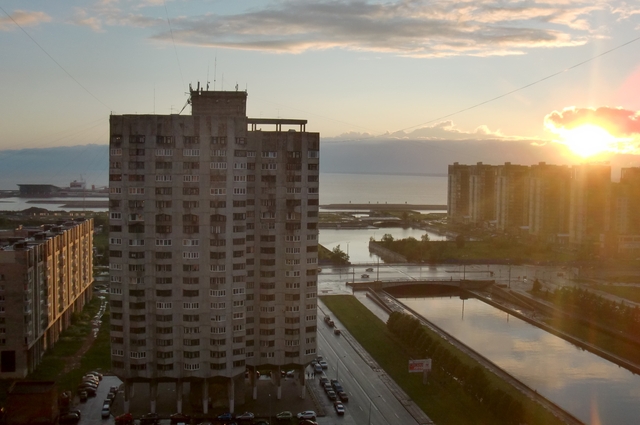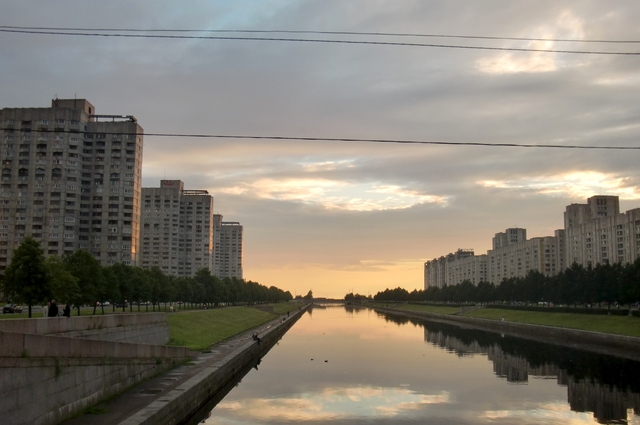 The view from the stairwell of 6 Novosmolenskaya Naberezhnaya at 11 pm.
The view from the stairwell of 6 Novosmolenskaya Naberezhnaya at 11 pm.
White Nights
“I wish I had lived in the Soviet Union,” Nastya says. We are sitting on the banks of the canal, eating the chocolates that she brought.
“Why?” I ask.
“I don’t know. I just do. To have experienced it…”
“Do you think you would have liked it?”
“Probably not.” Nastya looks wistful and doesn’t say more.
“It was a miraculous night, the sort of night that can only occur when you are young.”
This sentence opens the novella White Nights, which Dostoevsky wrote in 1848 when he was still the “sentimental dreamer” from whose memoirs it is supposedly taken. Years later, after a long stint in Siberia, he returned to Petersburg and wrote the memoirs of the Underground Man, a very different kind of dreamer. The dark, ugly, stinking Petersburg of Notes from Underground is nothing like the Petersburg of White Nights, but they are nevertheless the same city. Petersburg is a state of mind, a geographical space that can be the best or the worst place on the earth depending on the season and your mood. In the words of the Underground Man, it is at once “the most abstract and intentional city in the world.”
Everything in Petersburg is in stasis. It exists in the blue time of twilight at midnight, the sun skirting the sky but never setting or rising. Everything is perpetually breaking down, but not quite broken. Walter Benjamin, when he visited Moscow in the 1920s, wrote that remont was everywhere. But Petersburg now is not in remont so much as it is in abandonment, like the workers left one day for their lunch break and never came back. Abandoned factories with smashed-out windows line the streets of Vasilevsky Island. The apartment buildings in this section of the city, where the tourists never go, are all Brezhnev-era concrete monstrosities. At night, more than half the windows are dark. During the day, you can see the gaping holes of broken windows and graffiti in ugly colors. Weeds and gangly trees grow amongst rebar and crumbled concrete in the abandoned lots between buildings.
This Soviet city is only two metro stops from the comfortably European Nevsky Prospekt, Hermitage, and summer garden. But this, too, is Petersburg. The impression is of a city built for giants, not humans. The scale of the buildings is fantastic. Each high rise is huge. A narrow, superbly straight canal bisects the island cleanly, running out to the Gulf of Finland. The giants who were supposed to live here never came. The new kind of man for whom these buildings were constructed never materialized. But the entire city still feels like it is waiting, which is another kind of stasis. And while they wait in the perpetual twilight, Petersburg’s entirely human inhabitants laugh and talk and smoke, play music on the banks of the canal, hang their laundry out of the windows. They are squatters, homeless people in this city of giants, but they live and keep on living and are not alone.
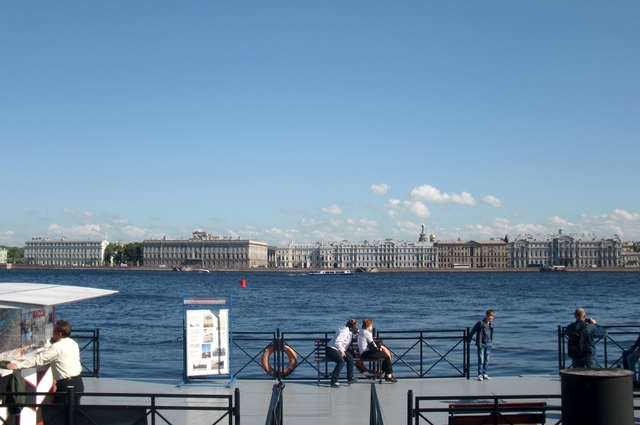
Iconic Petersburg. Tourists and locals alike gaze across the river from the Neva Gate of the Peter Paul fortress to the Palace Embankment on the other side. Maya Koretzky
Only two of the four elevators in my building ever work at once, and day-to-day it is never the same two. I live in constant fear of getting stuck in one of them, or plummeting to my doom. The view of the Gulf of Finland from the twenty-first floor of my high rise is stunning, but not worth the approximately eleven seconds of terror as the elevators rattle and stutter alarmingly up and down decaying concrete shafts. You can do a lot in eleven seconds. It is certainly enough time to think about the unfinished thesis you’ll be leaving behind, to plan your obituary, to imagine the student newspaper calling up your advisor and asking her about you. “Maya was a wonderful student,” she would say. “But she should have taken the stairs.”
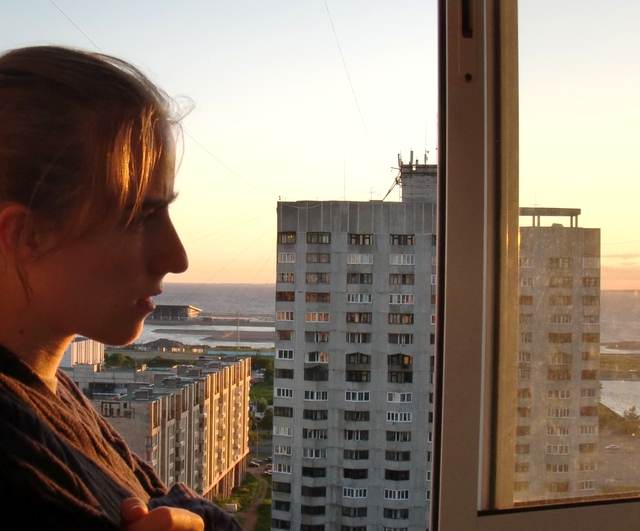
Looking out over the Smolenka Canal from the twenty-first floor of 6 Novosmolenskaya Naberezhnaya. Maya Koretzky
When the elevators become unbearable, I really do try taking the stairs. I give that up after seeing the rusted through railings on the inside, nothing to prevent a twenty-one-story fall onto hard concrete and broken glass. It wouldn’t be a problem, except that there are no lights on the stairs, so if the doors to the landings are closed, the entire stairwell is pitch black. You have to edge down, back to the wall, moving step by step and hoping not to encounter anything particularly sharp, like the used needles on the twelfth floor, or particularly squishy, like the pile of evidently human shit on the seventh floor. No, the stairs are not an option.
Each trip up to my apartment is an exercise in faith, and perhaps that is not a bad thing. Living in a country where the letters look like they are written backwards (even after four years of studying the language), where the only thing that runs on time is the metro, where I stand out every time I open my mouth, is an exercise in faith. You have to give up control over the things you can’t change, you have to learn to live in the electric space of chance. In Russian, the word for lucky, schastlivi, is the same as the word for happy. I am truly alive in the eleven seconds of travel in the elevator. I listen to my breathing and hear the pulleys squeak. And each time the door slams open and I’m safely on a solid floor I am schastlivi.
At the university, I have intensive Russian class every day from 9am until 3pm with three other American students. Even though we are forced to speak Russian in class, it is ironically the most American of my Russian experiences. In class we repeat phrases and conjugate verbs while heat shimmers past the open windows and our teachers fan themselves with the textbooks. When the teachers leave the room, we complain to each other in whispered, illicit English about the difficulties of taking the bus and the long walk from the metro station to the university. At lunch, the American students sit together in the university cafeteria and sneak English words into broken conversations in Russian.
One day at lunch, I sit with a group of Russian students who have been assigned to our program as language tutors. This is how I meet Kolya, Polya, and Nastya. Through them, I meet Pasha and Kisenia. They get my phone number the first day, then start inviting me everywhere. We go to Novaya Gollandiya, an island in the middle of the city where we have picnic dinners and listen to music. We visit the Peter-Paul Fortress, once the most feared prison in Tsarist Russia, now a public park where young Russians stroll hand in hand. At a tiny café on the roof of a condemned building-turned art gallery, Pasha destroys me in a game of chess in less than five moves. And at the university, I no longer speak English at lunch.
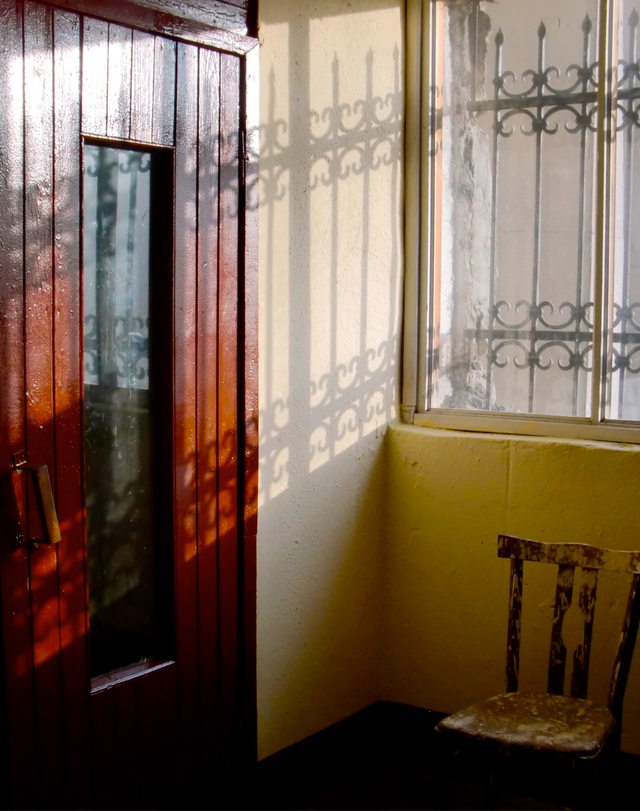
Early morning sun casts shadows above a paint-splattered chair left in the stairwell of 6 Novosmolenskaya Naberezhnaya. Maya Koretzky
One weekend, on impulse, I take the train to Moscow with two other American students. As it turns out, taking the train in Russia is an experience in itself, and one to which our day in Moscow hardly compares. On the train there, we speak in English and get dirty looks from the people next to us. We switch to Russian and immediately the girl in the bunk next to me introduces herself. Babushki offer us strawberries, which we accept. It’s like opening up the door to a whole new world, like taking apart the tower of Babel brick by brick. We are on the provincial train, because it is cheaper. This is the train that goes all the way through to the Urals, and the Urals are where most of our companions are headed. They tell us stories of dusty villages in the summer, of old grandparents they are going to visit, of students coming home for break.
On the train back, we meet Sergei, who is from Moscow but headed to Petersburg to help his girlfriend repaint her apartment. He is desperate to talk in English, and keeps asking me about conjugations. His English is terrible, but we speak in it anyway. I have a bottle of cheap vodka. He has a homemade dinner. We put our offerings on the table and split them. Later on, the train rumbles past Lake Ladoga, where fishermen fish in the 4 am twilight and where, in the terrible winters of 1941-44, supply trucks cut their way across the ice in an effort to stem rampant starvation in blockaded Petersburg. “We has more soul than other people,” Sergei tells me. “We have,” I correct his grammar absently, but I think I know what he means anyway.
The train rolls into Petersburg before sunrise and Sergei and I get on the metro in different directions. I ride half asleep until the metro line ends at my stop, the last stop before island turns to water and Finland is visible on the horizon. I emerge, rubbing my eyes, into a transformed city. While I was hurtling through the dark tunnels below the Neva, somewhere above dawn broke in earnest on Petersburg. The entire city is tinged in gold, it glitters on the canal, fills the stairwell of my building from the ground floor up, breaking past the bars on the first floor window. The change is shocking and surprisingly affecting. It’s no red dawn, but it feels like the start of a wondrous new world all the same.
Whispered conversations behind padded doors, romantic trysts in the open-air privacy of stairwells, long lines for information on political prisoners, which become long lines for food, which become long lines for blue jeans—all this is a cultural heritage which I am not heir to, no matter how much I might wish it, no matter how much I try to understand it. I try to imagine myself walking home in 1949, ‘59, ‘69. In the archives, the old newspapers crackle as I go back even farther. I read about a wedding that happened across the road one hundred and forty years ago, about a scandal that erupted on Nevsky Prospekt just down the street and two hundred years in the past. The geography of Petersburg is acutely temporal as well as spatial, but the years are condensed, layered, and buried. It takes a particular kind of gaze to begin to see the nineteenth century underneath the twentieth.
This buried time is literal as well as metaphorical. Petersburg may be built on a swamp, but the houses of Vasilevsky Island are built on a graveyard. Before the city expanded, before the canal system improved, it was the city’s biggest cemetery, and it is the place where the graves of the Tsar’s opponents lie unmarked and unnamed. The very edge of Vasilevsky Island was once Smolenskoe Pole, the execution grounds for state criminals. The Decembrists, an aristocratic group of revolutionaries, were killed and buried here in the 1820s. The five infamous members of the People’s Will, the group of terrorists who killed Alexander II, lie here too, somewhere beneath the concrete foundations of the 1950s high rises, or perhaps along the weedy banks of the canal. Walking home very early in the morning, when it is well and truly dark for the first time in weeks, I can almost feel their breath on the back of my neck. I wonder what they would think of their bones mixing with the concrete dust of the Soviet state.
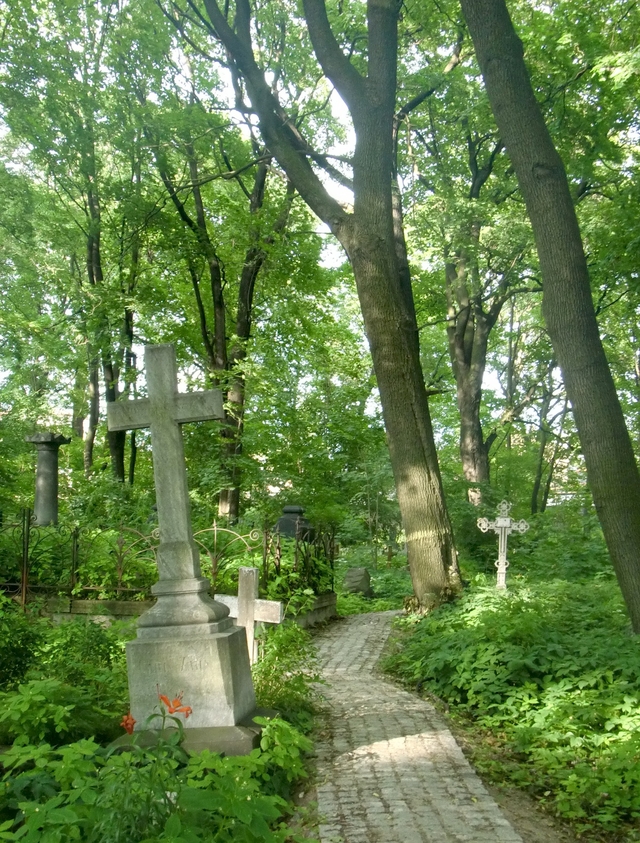
Vasilevsky Island’s buried past. Leaning crosses line a pathway in the overgrown Lutheran cemetery by the Smolenka river. Both the Lutheran cemetery and the island’s larger, better-kept, Orthodox cemetery have been in use for over two centuries. Maya Koretzky
My last day in Petersburg, I visit a banya with one of my American friends. Traditional Russian bathhouses are a common tourist attraction, and we are both a bit skeptical. But, we quickly realize that the particular banya we have selected is not for tourists. As we are changing in the broken-tile, grim-looking locker rooms, the banya attendant rushes up to us and says with gleeful officiousness, “Girls, bathing suits are forbidden!” Pleading is no use. There is nothing for it but to strip or walk out. My friend and I glance at one another and try not to laugh. Why not? I take off the last few layers.
The main room of the banya is tiled in grimy white squares, floor to ceiling. There are rusted spigots with cold water and greening showerheads with warm water. There is a small, raised pool in one corner and a door that leads through to a sauna in the other. All of the other women are far older than we are—grandmothers, with sagging flesh and wrinkled bodies. In the sauna, I find myself answering their questions—about America, my family, what brings me to Petersburg—with a fluency that surprises me. I have never spoken Russian better. Then it dawns on me. The worst has already happened. I am speaking in a different language to strangers, while covered in sweat and totally naked. This is the stuff of Russian class anxiety nightmares. It is strangely freeing.
This is the most naked I have been in years. Maybe it is the most naked I have been ever. I am unprepared for the extent of my nakedness, but I am also unprepared for how comfortable I feel in my skin. I dive into the cold pool after the sauna. One of the grandmothers asks me to rub coffee grinds into her back under the shower to exfoliate her skin. In return she does the same for me. I can almost feel the dead skin peeling away from my body. The feeling is cathartic and bittersweet. My plane leaves in less than twelve hours. It feels like Russia is being stripped away from me, layer by layer. But, as I lie floating once again in the pool, pink and new, I’m not sure what exactly is left behind.
“I wish I had lived in the Soviet Union,” Nastya says. We are sitting on the banks of the canal, eating the chocolates that she brought as a goodbye present after the last day of class.
“Do you think you would have liked it?”
“Probably not.” Nastya looks wistful and doesn’t say more. In the distance, someone is strumming a guitar and singing, but the words and tune are indistinct. Old men stand on the banks of the canal and smoke in striped sailor’s undershirts. A couple walks by holding hands.
“Did I tell you,” Nastya says, “I’ve applied to study in America?”


